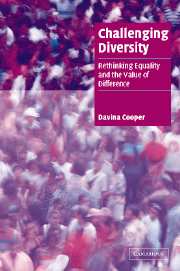Book contents
- Frontmatter
- Contents
- Acknowledgments
- 1 Introduction: mapping the terrain
- 2 Diversity politics: beyond a pluralism without limits
- 3 From blokes to smokes: theorising the difference
- 4 Towards equality of power
- 5 Normative encounters: the politics of same-sex spousal equality
- 6 Getting in the way: the social power of nuisance
- 7 Oppositional routines: the problem of embedding change
- 8 Safeguarding community pathways: ‘possibly the happiest school in the world’ and other porous places
- 9 Diversity through equality
- Bibliography
- Index
- Cambridge Cultural Social Studies
2 - Diversity politics: beyond a pluralism without limits
Published online by Cambridge University Press: 22 September 2009
- Frontmatter
- Contents
- Acknowledgments
- 1 Introduction: mapping the terrain
- 2 Diversity politics: beyond a pluralism without limits
- 3 From blokes to smokes: theorising the difference
- 4 Towards equality of power
- 5 Normative encounters: the politics of same-sex spousal equality
- 6 Getting in the way: the social power of nuisance
- 7 Oppositional routines: the problem of embedding change
- 8 Safeguarding community pathways: ‘possibly the happiest school in the world’ and other porous places
- 9 Diversity through equality
- Bibliography
- Index
- Cambridge Cultural Social Studies
Summary
The politics of diversity identifies a discursive space of considerable plasticity and range, produced from the particular admixture of post-Marxism, feminism, queer politics, liberalism and poststructuralism. In short, diversity politics names an analytical, critical and visionary space oriented around the constitutive role of power in producing social difference and identity, the expression and realisation of human agency, the value of diversity – both for individuals and society – the moral entitlement to freedom, the right to express difference in the public sphere and the disavowal of domination and oppression. For Jeffrey Weeks (1993: 208) it entails ‘a value system … which accept[s] both diversity and a wider sense of human solidarity’. Zillah Eisenstein (1994: 175), focusing also on the normative dimension, writes:
I inscribe the liberal notion of privacy with an egalitarian text that does not assume sameness as a standard, but rather recognizes a radically pluralist individuality. Radical pluralism means differences are not ordered hierarchically; they are not set up as oppositions; they are not tied up with, or reflective of, power relations. They merely reflect diversity.
My aim in this chapter is to explore the common ground, and the lines of tension that circulate through the politics of diversity. To do so, I draw on the writing of a number of authors whose work is broadly situated within this terrain.
- Type
- Chapter
- Information
- Challenging DiversityRethinking Equality and the Value of Difference, pp. 15 - 39Publisher: Cambridge University PressPrint publication year: 2004
- 1
- Cited by

